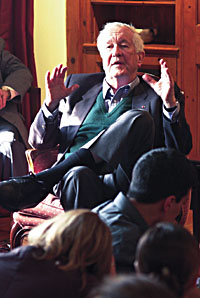
William Styron |
to confront the taboo in his fiction
Although he is considered one of the greatest American novelists of his generation, William Styron became so incapacitated by depression at times of his life that he was unable to write at all, he told his audience at an April 10 master's tea at Branford College.
The author of the memoir "Darkness Visible," about his first bout of severe depression in middle age, Styron has indeed become as associated with the debilitating mood disorder as he has with some of his best known works, "Sophie's Choice" and "The Confessions of Nat Turner."
"I am living proof that people can recover and do recover," he said of an illness which, he noted, can often lead to suicide. He also said that he had suffered another episode of depression last year, which "brought me to places I had never been before."
Despite the hope he held out about combating depression, Styron also said, "One cannot be glib about depression. One cannot say, 'Take some Prozac and it will go away,' because it won't."
Of the toll the illness has had on his work, Styron said he has had regrettable stretches of being fallow as a writer. "All my life I have been haunted by what must be the incipient powers of depression," he explained.
Styron added, "I do believe that there is a correlation between creativity and depression -- especially manic-depression." He classified his illness as "manic depression 2," a low-grade form of the disorder.
Speaking about his work, Styron said he got the idea for "Sophie's Choice" -- a novel set in Brooklyn in the aftermath of the Holocaust -- from a passage in André Malraux's "L'Espoire": "I seek a central region of the soul where absolute evil meets brotherhood." The character of Sophie, he commented, was inspired by a Polish Catholic woman of his acquaintance in Brooklyn who was herself a survivor of the Holocaust. The story of a woman having to choose which of her two children would live was influenced by a similar case he had read about in Hannah Arendt's "Eichmann in Jerusalem." From the time these ideas coalesced, Styron says, he began the "workman-like" process of writing the novel: "plug away day in and day out until finally you have a book." ("I hope I haven't oversimplified that," he added.)
Although "The Confessions of Nat Turner" won a Pulitzer Prize, the Southern-born Styron was criticized for writing in the first person about a black man. Asked by an audience member if he would have written it differently today, Styron gave an emphatic "no." The criticism he received of the book, he said, was "spurious" and politically motivated and "utterly wrongheaded."
Styron staunchly defended his practice of confronting taboo subjects such as the Holocaust or slavery. After seriously reflecting on the question, he reported, he decided that matters considered off limits to writers of fiction were not, in fact, sacrosanct. "I was determined," he said, "to break through that taboo or proscription and deal with it on my own terms."
-- By Dorie Baker
T H I S
Bulletin Home
 W E E K ' S
W E E K ' S S T O R I E S
S T O R I E S![]()
 Team learns how hepatitis C virus recruits cells' RNA
Team learns how hepatitis C virus recruits cells' RNA
![]()
![]()
 'Art for Yale' charts growth of gallery's collections
'Art for Yale' charts growth of gallery's collections![]()
![]()
 Ten honored for their work promoting town-gown relations
Ten honored for their work promoting town-gown relations![]()
![]()
 Pulitzer Prize-winning playwright describes his inspirations and aspirations
Pulitzer Prize-winning playwright describes his inspirations and aspirations![]()
![]()
 Center offers programs in uncommonly taught languages
Center offers programs in uncommonly taught languages![]()
![]()
 Study: Teens' reputations offer clue to their risk-taking behavior
Study: Teens' reputations offer clue to their risk-taking behavior
![]()
![]()
 Yale Rep serving up cocktail of hope and cynicism in 'Big Night'
Yale Rep serving up cocktail of hope and cynicism in 'Big Night'![]()
![]()
 Author Styron defends decision to confront the taboo in his fiction
Author Styron defends decision to confront the taboo in his fiction![]()
![]()
 Exhibit of photographs shows Yale as 'a place of changes'
Exhibit of photographs shows Yale as 'a place of changes'![]()
![]()
 Annual film festival to take place at campus sites and nearby venues
Annual film festival to take place at campus sites and nearby venues
![]()
![]()
 Symposium will explore 'trends in machine learning'
Symposium will explore 'trends in machine learning'
![]()
![]()
 Concerts feature works by Yale composers that integrate computer technologies
Concerts feature works by Yale composers that integrate computer technologies
![]()
![]()
 Medical Library exhibit examines the evolution of microscopes
Medical Library exhibit examines the evolution of microscopes
![]()
![]()
 Creative Arts Workshop pays tribute to Yale artists in exhibition
Creative Arts Workshop pays tribute to Yale artists in exhibition
![]()
![]()
 'Administrative Professionals' Day to be celebrated April 25 and 26
'Administrative Professionals' Day to be celebrated April 25 and 26
![]()
 |
| Visiting on Campus
Visiting on Campus |
| Calendar of Events
Calendar of Events |
| In the News
In the News |
| Bulletin Board
Bulletin Board![]()
Yale Scoreboard |
| Classified Ads
Classified Ads |
| Search Archives
Search Archives |
| Deadlines
Deadlines![]()
Bulletin Staff |
| Public Affairs Home
Public Affairs Home |
| News Releases
News Releases |
| E-Mail Us
E-Mail Us |
| Yale Home Page
Yale Home Page